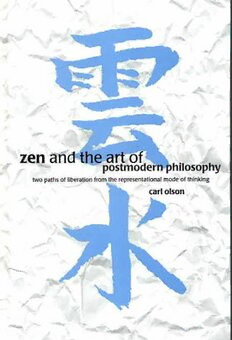Download Zen and the Art of Postmodern Philosophy: Two Paths of Liberation from the Representational Mode of Thinking PDF Free - Full Version
Download Zen and the Art of Postmodern Philosophy: Two Paths of Liberation from the Representational Mode of Thinking by Carl Olson in PDF format completely FREE. No registration required, no payment needed. Get instant access to this valuable resource on PDFdrive.to!
About Zen and the Art of Postmodern Philosophy: Two Paths of Liberation from the Representational Mode of Thinking
This book examines and compares the philosophical positions of various postmodern thinkers and Zen Buddhist philosophers on: language and play; modes of thinking; skepticism and doubt; self and other; time and death; nihilism and metaphysics; and the conception of the end of philosophy. The Zen thinkers dealt with are Dogen and Nishitani, and the Western thinkers are Derrida, Lacan, Heidegger, Lyotard, Foucault, Deleuze and Guatarri, Kristeva, and Levinas. Although each share similar notions concerning the shortcomings of representational thinking, major differences still exist. By clarifying these differences, Olson counters the tendency to overtly assert or covertly imply that postmodern and Zen philosophies are moving in the same direction. Some postmodern thinkers and Zen Buddhist philosophers share common philosophical ground with regard to a mutual philosophical attack and attempt to overcome the perceived shortcomings of the representational mode of thinking that conceives of the mind like a mirror and assumes a correspondence between appearance and reality that is supported by a metaphysical structure.
Detailed Information
| Author: | Carl Olson |
|---|---|
| Publication Year: | 2000 |
| ISBN: | 9780585375045 |
| Pages: | 347 |
| Language: | English |
| File Size: | 1.321 |
| Format: | |
| Price: | FREE |
Safe & Secure Download - No registration required
Why Choose PDFdrive for Your Free Zen and the Art of Postmodern Philosophy: Two Paths of Liberation from the Representational Mode of Thinking Download?
- 100% Free: No hidden fees or subscriptions required for one book every day.
- No Registration: Immediate access is available without creating accounts for one book every day.
- Safe and Secure: Clean downloads without malware or viruses
- Multiple Formats: PDF, MOBI, Mpub,... optimized for all devices
- Educational Resource: Supporting knowledge sharing and learning
Frequently Asked Questions
Is it really free to download Zen and the Art of Postmodern Philosophy: Two Paths of Liberation from the Representational Mode of Thinking PDF?
Yes, on https://PDFdrive.to you can download Zen and the Art of Postmodern Philosophy: Two Paths of Liberation from the Representational Mode of Thinking by Carl Olson completely free. We don't require any payment, subscription, or registration to access this PDF file. For 3 books every day.
How can I read Zen and the Art of Postmodern Philosophy: Two Paths of Liberation from the Representational Mode of Thinking on my mobile device?
After downloading Zen and the Art of Postmodern Philosophy: Two Paths of Liberation from the Representational Mode of Thinking PDF, you can open it with any PDF reader app on your phone or tablet. We recommend using Adobe Acrobat Reader, Apple Books, or Google Play Books for the best reading experience.
Is this the full version of Zen and the Art of Postmodern Philosophy: Two Paths of Liberation from the Representational Mode of Thinking?
Yes, this is the complete PDF version of Zen and the Art of Postmodern Philosophy: Two Paths of Liberation from the Representational Mode of Thinking by Carl Olson. You will be able to read the entire content as in the printed version without missing any pages.
Is it legal to download Zen and the Art of Postmodern Philosophy: Two Paths of Liberation from the Representational Mode of Thinking PDF for free?
https://PDFdrive.to provides links to free educational resources available online. We do not store any files on our servers. Please be aware of copyright laws in your country before downloading.
The materials shared are intended for research, educational, and personal use in accordance with fair use principles.

